|
|
|
Sort Order |
|
|
|
Items / Page
|
|
|
|
|
|
|
| Srl | Item |
| 1 |
ID:
142871
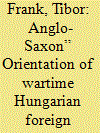

|
|
|
|
|
| Summary/Abstract |
The political élite of Hungary included a group that expected British and American support for Hungarian revisionist claims after the Paris Peace Conference. Their acknowledged leader was Count István Bethlen, the prime minister from 1921 to 1931 and an adviser to Regent Vice-Admiral Miklós Horthy until 1944. This analysis investigates a largely forgotten member of this group. Antal Ullein-Reviczky, a diplomat and scholar, shifted from being a Hungarian nationalist with an anti-Nazi attitude towards secret efforts to establish political relations with Britain during the Second World War. Press chief of the Foreign Ministry and the prime minister’s office, Ullein-Reviczky’s last appointment was Hungarian minister at Stockholm in 1943–1944. Both the Germans and the British put little trust in a man whose wife was the daughter of a British diplomat, yet who maintained superb connexions in pro-German Hungary. He changed his mind gradually when he realised that the price for revising the Treaty of Trianon was unacceptable. His long journey through international politics made him a significant player in a global drama, also assisting Raoul Wallenberg’s mission to Budapest. It is a political odyssey worth remembering.
|
|
|
|
|
|
|
|
|
|
|
|
|
|
|
|
| 2 |
ID:
132312
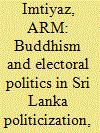

|
|
|
|
|
| Publication |
2014.
|
| Summary/Abstract |
Organized religions often play a significant role in the political affairs of any country when political actors carefully employ them to pursue power. Buddhism is the major religion on the island of Sri Lanka, and often it becomes a powerful symbol for Sinhala-Buddhist politicians. This study examines the interaction between Buddhism and politics in Sri Lanka, and will attempt to examine the religious factors in Sri Lanka's ethnic conflict between the two nations; namely, Tamil and Sinhala. It will examine how the politicization of Buddhism helped Sinhala political elites and leaders in their quest for power, reinforcing religious and ethnic tensions, and finally will discuss some solutions to de-religionize the state structure to help Sri Lanka enjoy the fruits of modernization and democracy.
|
|
|
|
|
|
|
|
|
|
|
|
|
|
|
|
| 3 |
ID:
132553
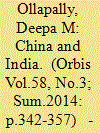

|
|
|
|
|
| Publication |
2014.
|
| Summary/Abstract |
How well do theories of economic interdependence and structural realism explain the India-China divergence between growing economic relations and continuing strategic mistrust? This article looks at the Indian side and argues that we need to go beyond economic and strategic factors, and brings in a more contingent approach based on domestic elite discourse and thinking. The article suggests that a more nuanced and complex debate on China is emerging in India than that posited by interdependence or realism, a debate that is framed by what I term nationalist, realist and globalist schools of thought, with the latter two groups currently holding the center of gravity.
|
|
|
|
|
|
|
|
|
|
|
|
|
|
|
|
| 4 |
ID:
114587
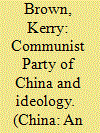

|
|
|
|
|
| Publication |
2012.
|
| Summary/Abstract |
The People's Republic of China since 1978 has been called a post-Communist and post-ideological society. And yet, at least in terms of maintaining an institutional network of party schools and think tanks, and a common conceptual language for the political elite within the Communist Party, China continues to put resources and effort into what could be construed as ideological work. What is the function of this, in a society which is undergoing dynamic economic and social reform? Does ideology continue to perform a role in building up cohesiveness amongst the political elite in contemporary China, and if so, how? This article looks at the ways in which ideology is formulated in the key speeches of Hu Jintao and in the institutional and linguistic context of these.
|
|
|
|
|
|
|
|
|
|
|
|
|
|
|
|
| 5 |
ID:
187110
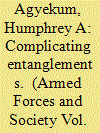

|
|
|
|
|
| Summary/Abstract |
Scholarly debates on civil–military relations often focus on how the military impacts society. Adding to the vast literature of civil–military relations, this article examines how socio-cultural practices and societal developments in the host society affect the military. Based on long-term ethnographic engagement with the Ghana Armed Forces, the piece presents empirical observations of how culturally informed practices, such as begging via proxies (djuan toa), infiltrate the Ghanaian military barracks and affect the institutions’ functioning. The article illustrates how two additional elements, skewed recruitment practices and the politicisation of the rank and file, are used as tools by political factions, such as Ghana’s two most prominent parties (the New Patriotic Party and National Democratic Congress), seeking to gain control over the Ghanaian military. The article analyses how these approaches contribute to undermining the armed forces’ discipline and military professionalism and consequently affect the military institution as a whole.
|
|
|
|
|
|
|
|
|
|
|
|
|
|
|
|
| 6 |
ID:
139284
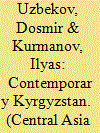

|
|
|
|
|
| Summary/Abstract |
The authors undertake the challenging task of going to the roots of the political instability that enveloped Kyrgyzstan during the period of democratic transit and discover that the bureaucratic state cannot adapt democratic values to the local conditions and, most importantly, does not want to do this. The political elite of Kyrgyzstan, which remains under the spell of Soviet political and spiritual legacy and which has been exhausted by two coups, demonstrates a very low level of cohesion and weakened political will. The authors describe the ways and means that will help the state and society remove the obstacles and remedy the shortcomings to finally acquire political stability and move forward.
|
|
|
|
|
|
|
|
|
|
|
|
|
|
|
|
| 7 |
ID:
132710
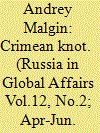

|
|
|
|
|
| Publication |
2014.
|
| Summary/Abstract |
Russia will have to deal with the effects of Crimea being part of an independent Ukraine for 23 years. A Crimean political and business elite has emerged with its own values, bonds, and relationships. Russia is not the motherland of an entire generation of Russian-speaking youth, but the motherland of their ancestors.
|
|
|
|
|
|
|
|
|
|
|
|
|
|
|
|
| 8 |
ID:
129614


|
|
|
| 9 |
ID:
109082
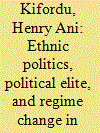

|
|
|
|
|
| Publication |
2011.
|
| Summary/Abstract |
Since the 1960s, intermittent social conflicts in Nigeria appear mostly linked to ethnic groups' differences. Considering the importance of regime change in social and political stability, this article critically analyses the historic and dynamic role of the core political executive elite in the political system's stability. The article argues that ethnic politics persist in Nigeria based on the nature of interactions between political institutions, institution-builders, and society. It asserts a contradictory link between deep-rooted elite interests and popular preferences in ways that undermine orientations towards democracy. The empirical focus is on the composite nature of the core political executive elite analysed through their ethnic and educational backgrounds. It is observed that, although ethnic shocks are variously motivated, the atypical shape and inequity in power and role distribution at the highest levels of executive office-holding stand out as a salient source and target of antagonism by ethnic groups. This finding has a paradoxical implication: deep-seated economic and political interests of the elite play a diversionary role from the real causes of ethnic conflicts in Nigeria.
|
|
|
|
|
|
|
|
|
|
|
|
|
|
|
|
| 10 |
ID:
173270
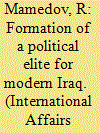

|
|
|
|
|
| Summary/Abstract |
THREE KEY EVENTS have changed both Iraq and the Middle East: the 1979 revolution in Iran, the Iran-Iraq war from 1980 to 1988, and the 1991 crisis in Kuwait. The latter led to a change in the domestic policies of Iraqi President Saddam Hussein and introduced new variables to the dynamics of the government's relations with ethnic and religious groups (mainly Shiites and Kurds). It was at this time that the UN began implementing sanctions on Iraq, including a blockade. The results of the sanctions left part of the elite with limited access to the distribution of resources; coupled with the government's practice of marginalizing a portion of the population, this led to migration and strengthening of exiled opposition forces. The U.S. brought not only economic but military pressure to bear on Baghdad. The U.S.'s tactical military incursions destroyed Iraq's infrastructure and disrupted the stable functioning of state structures.
|
|
|
|
|
|
|
|
|
|
|
|
|
|
|
|
| 11 |
ID:
132712
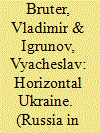

|
|
|
|
|
| Publication |
2014.
|
| Summary/Abstract |
The participation of Donetsk representatives in the government corresponds to the "horizontal principle," but domination does not. There will be neither real reform nor a modern and efficient state in Ukraine unless regions feel that they are equal.
|
|
|
|
|
|
|
|
|
|
|
|
|
|
|
|
| 12 |
ID:
133123
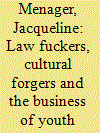

|
|
|
|
|
| Publication |
2014.
|
| Summary/Abstract |
Myanmar's rolling political and economic transition is being shaped by profound generational change. Little attention has been paid to the priorities and politics of the new generation of youth. This article seeks to explore the construction of Myanmar's elites as a homogenized, unitary, uncontested group through a close examination of elite youth. The article challenges some basic preconceptions about Myanmar's elites. Three primary youth cohorts are appraised and situated in the transition: the entitled business elite, the cultural forgers and the resistant forces. All three groups are privileged in Myanmar society, where their power struggles see efforts to assert degrees of cultural supremacy. Drawing on ethnographic research in Myanmar, the article offers insights into the role of elite youth in Myanmar's future and their perceptions of the present shift of national political and economic policies.
|
|
|
|
|
|
|
|
|
|
|
|
|
|
|
|
| 13 |
ID:
078971
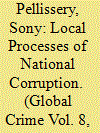

|
|
|
|
|
| Publication |
2007.
|
| Summary/Abstract |
This paper provides a bottom-up view of national corruption in India and presents a framework of corruption involving three actors: bureaucrat, politician and legitimate claimant. The paper then focuses on the public service provision of social security in an Indian village and the role of elites in perpetuating the corrupt practices to access this public provision. This study is based on an extensive fieldwork and uses network data. First, I show that the political elite bridges the 'structural hole' between the institutions of state and society, have the advantage of information, referrals and are the main beneficiary of local corrupt practices. Second, factional politics is carried out through the use of corruption and it results in exclusion of the poor persons from the welfare rights to which they are entitled. The paper also explores how the local processes of corruption interact with state-level processes and shows how protest against corruption is silenced.
|
|
|
|
|
|
|
|
|
|
|
|
|
|
|
|
| 14 |
ID:
145744
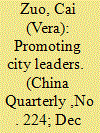

|
|
|
|
|
| Summary/Abstract |
The shift in Beijing's priorities to more balanced and people-oriented development has led some localities to make more efforts in developing social policy areas. By investigating the personnel institution, a political incentive mechanism, this article aims to shed light on the structure of political incentives in China and why local political leaders improve public welfare in a non-democratic setting. A content analysis of 69 regulations that cover one-third of all municipal leaders shows that the formal evaluation rules for leaders in some localities have become more welfare-oriented to reflect Beijing's new focus on social policy areas. A statistical analysis further reveals that different political incentives operate for municipal Party leaders and mayors, and that political incentives to develop social policy vary across geographic regions. The statistical analysis exploits an original dataset I compiled from an online archive and statistical yearbooks, and contains biographic and career history data on municipal leaders between 2003 and 2010.
|
|
|
|
|
|
|
|
|
|
|
|
|
|
|
|
| 15 |
ID:
132944
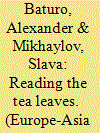

|
|
|
|
|
| Publication |
2014.
|
| Summary/Abstract |
In the absence of public information on the inner workings of the Russian political regime, especially during Medvedev's presidency, outside observers often have to rely on politicians' unguarded comments or subjective analysis. Instead, we turn to quantitative text analysis of political rhetoric. Treating governors as a quasi-expert panel, we argue that policy positions revealed in regional legislative addresses explain how elites perceived the distribution of power between Putin and Medvedev. We find that governors moved from a neutral position in 2009 to a clearly pro-Putin position in 2011, and that policy initiatives advocated by Medvedev all but evaporated from the rhetoric of governors in 2012.
|
|
|
|
|
|
|
|
|
|
|
|
|
|
|
|
| 16 |
ID:
147820
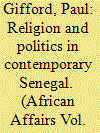

|
|
|
|
|
| Summary/Abstract |
Senegal has a clientelist political system, which is personalized, opaque, and characterized by wide impunity for the political elite. The most salient social force in the country is the Sufi brotherhoods, especially the most important religious families within them, which have been an integral part of the clientelist system since the time of Diouf (1981–2000). Although the essence of a brotherhood is the disciples’ submission to the will of the guide, it was never the case that a guide could simply deliver his disciples’ votes to his chosen politician. Disciples could distinguish political from religious injunctions, and a combination of economic and political factors also influenced decisions. Nevertheless, the Mouride brotherhood in particular benefited under Abdoulaye Wade (2000–12), who publicly identified himself as a disciple – and, in turn, Mourides tended to give him their support. Macky Sall (2012–present) in his presidential election campaign appeared more negative towards all religious forces, a neglect seemingly evident in certain problems that have arisen since his election. Yet, though the brotherhoods still exercise considerable power, this article argues that their influence is waning. External factors from the wider Islamic world explain this decline in influence, as well as internal factors such as the commercialization of the religious families and the growing reluctance of increasingly educated disciples to be dictated to in political matters.
|
|
|
|
|
|
|
|
|
|
|
|
|
|
|
|
| 17 |
ID:
132509
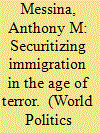

|
|
|
|
|
| Publication |
2014.
|
| Summary/Abstract |
In the context of the evidence presented in both the collected scholarship under review and other select works, this article asks if and to what extent migration-related issues have been securitized in Europe and the United States. In addressing these questions it executes three tasks. First, it critically assesses the four major dimensions across which contemporary immigration purportedly is securitized: on one side, rhetorically addressing immigration-related issues through political elite discourse, public opinion, and the mass media; and on the other, the policy processes through which immigration is securitized. Second, this article identifies the strengths and weaknesses of securitization theory as it has been applied to immigration. Finally, it draws mostly negative conclusions about the veracity of the central claims of the securitization of immigration literature and, specifically, its causal story.
|
|
|
|
|
|
|
|
|
|
|
|
|
|
|
|
| 18 |
ID:
132701
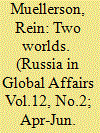

|
|
|
|
|
| Publication |
2014.
|
| Summary/Abstract |
International law doesn't work well in in a world with unipolar tendencies and when its interpretation is dictated from a unipolar center. But the world is simply too big, complex and diverse for that.
There are many causes of the current conflict in and around Ukraine. Due to the presence of all-pervading corruption that since 1991 has constantly increased from President to President, from administration to administration, and the absence of any meaningful efforts to bridge the potentially explosive historical, religious, ethnic and geographic divides of the country, Ukraine was on the edge of becoming a failed state even before it finally exploded on the Maidan. Neither the Ukrainian political elite nor those external actors, which have supported or continue to support the respective governments or oppositions, have ever acted in the best interests of the Ukrainian people as a whole.
|
|
|
|
|
|
|
|
|
|
|
|
|
|
|
|
| 19 |
ID:
133102
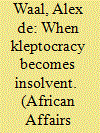

|
|
|
|
|
| Publication |
2014.
|
| Summary/Abstract |
South Sudan obtained independence in July 2011 as a kleptocracy - a militarized, corrupt neo-patrimonial system of governance. By the time of independence, the South Sudanese "political marketplace" was so expensive that the country's comparatively copious revenue was consumed by the military-political patronage system, with almost nothing left for public services, development or institution building. The efforts of national technocrats and foreign donors produced bubbles of institutional integrity but the system as a whole was entirely resistant to reform. The January 2012 shutdown of oil production bankrupted the system. Even an experienced and talented political business manager would have struggled, and President Salva Kiir did not display the required skills. No sooner had shots been fired than the compact holding the SPLA together fell apart and civil war ensued. Drawing upon long-term observation of elite politics in South Sudan, this article explains both the roots of kleptocratic government and its dire consequences.
|
|
|
|
|
|
|
|
|
|
|
|
|
|
|
|
|
|
|
|
|